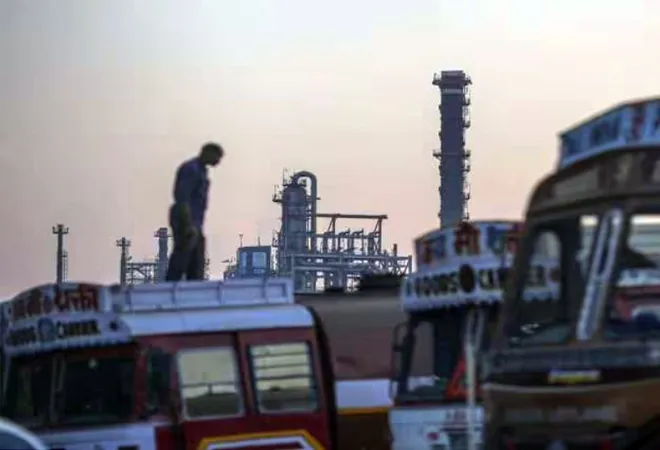The moniker often given to Iran, that of being the quintessential “survivalist state”, is not without merit. With both its highs and lows, Tehran has been at odds with the US since the 1979 revolution, and yet maintained a level of stability despite all challenges.
Since then, Iran has on and off been under economic and political isolation while having the
fourth largest proven oil reserves in the world. The geopolitics of West Asia (Middle East) through much of its contemporary history has revolved around oil, a commodity responsible for economic growth in the West and for the riches of regional powers such as Saudi Arabia.
Oil Aplenty, But Sanctions
However, post-revolution Iran missed many of these developments as its tensions with the West spiralled and its energy infrastructure crumbled. Others, including India whose ONGC Videsh discovered the Farzad B gas field, also took a step back as per these new geopolitical realities led by a preferred tool of pressure employed by the West: Sanctions.
The latter’s nuclear programme brought an immense sense of urgency in capitals such as Washington to re-engage as Iran’s nuclear bargaining chip came into play.
However, things have been gradually changing. The 2015 Joint Comprehensive Plan of Action (JCPOA, also known as the Iran nuclear deal) was a fork in the road for the historical animosity between the West and Tehran. The latter’s nuclear programme brought an immense sense of urgency in capitals such as Washington to re-engage as Iran’s nuclear bargaining chip came into play.
The JCPOA’s ambit was simple: Ease sanctions and allow economic growth in the country in exchange for strong checks and balances on its nuclear installations. The deal, while shackled by its own ambit, was the best workable option, until US President Donald Trump unceremoniously withdrew from it in 2018.
Such measures are also a product of the fact that today the US in itself is a
major energy power: both as producer and exporter, which it was not in critical eras such as during the Cold War. These realities of that time in turn shaped its foreign policy towards the Middle East to a large extent.
A Changing World Order
In May 2023, Iran sold its highest amount of oil, topping levels not witnessed since 2018. The US-led sanctions regime’s aims of keeping the Iranian economy in isolation did work intermittently, which eventually led Tehran to build a domestic consensus to begin
talks with the P5+1 group of states (UN Security Council permanent members + Germany).
The collapse of the JCPOA soon met with global tectonic shifts in the shape of the Russia-Ukraine conflict and an increasingly assertive China.
The Iranians mitigated their risk by continuation of their programme at a reduced, yet steady, pace led by an inherent mistrust of the US within its political classes, specifically the conservatives, who took over the leadership in August 2021 (ironically the history of Iranian nuclear programme dates back to the “
Atoms for Peace” speech by President Dwight D Eisenhower and the pre-1979 US-Iran relations).
The collapse of the JCPOA soon met with global tectonic shifts in the shape of the Russia-Ukraine conflict and an increasingly assertive China. Beijing has built itself as a nucleus of an “alternative” order challenging the post-WWII West-constructed liberal order. Despite this “new” ecosystem being built, it has much less in common between the states leading charge than the current international system.
Iranian Oil Finds Takers
Iran’s largest oil export markets today are China, Syria, and Venezuela. Asia is going to be the biggest market for hydrocarbons over the next decades, with China, India, South Korea, and Japan leading the charge. States in Southeast Asia will also require much more in the future to fuel growth.
Energy at the end of the day will be sourced from wherever it is most affordable. The fact that Iran started to sell cheaper oil to China than Russia shows its pragmatism at work across geopolitical lines.
The other important aspect of Iranian oil is that it directly impacts global pricing, with Tehran being a founding member of the cartel-like Organisation of Petroleum Exporting Countries (OPEC). Oddly, a flush of Iranian oil in the market is
undermining production cuts by the likes of Saudi Arabia looking to increase profits by increasing prices.
Beyond China And The US
The power of sanctions is
increasingly being questioned, the difference in future will be that it won’t be only the countries under sanctions, but those who rush to avoid getting stuck in between an oncoming China-US battle for global supremacy will increasingly look for alternatives.
The fact that Iran started to sell cheaper oil to China than Russia shows its pragmatism at work across geopolitical lines.
Increasing debates about “de-dollarisation” from
sectors of business where such arguments would have been unfathomable till recently shows fundamental changes in thought (action, meanwhile, is a whole different ball game). Iran is operating, with increasing success, amidst these modalities.
Its actions are not unusual. A country like India, a net importer of oil, had
hugged Saddam Hussein and agreed to
stop import of Iranian oil when the situation needed such a drastic stance, as per demands of realpolitik. States act in national interest first, whether others like it or not. Iran’s realities are no different.
This commentary originally appeared in MoneyControl.
The views expressed above belong to the author(s). ORF research and analyses now available on Telegram! Click here to access our curated content — blogs, longforms and interviews.




 PREV
PREV


